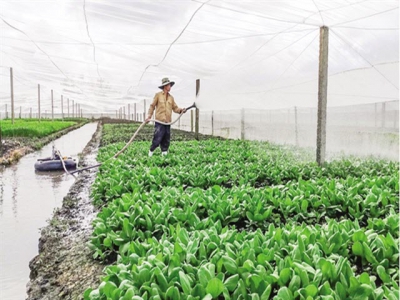Seminar discusses ways to add value to farm produce

Ho Chi Minh City — Improving production technologies, designs and packaging are among the important factors that could add value to Vietnamese farm produce, businesses have said.
A safe vegetable production farm in the Cửu Long (Mekong) Delta. Improving production techniques and packaging are among factors that could add value to farm products. — VNA/VNS Photo
Nguyễn Thị Các Thủy of Tây Cát Co., Ltd said to improve traditional products, producers needed to adopt technology, do research to enhance product quality and improve product designs.
If businesses were constantly innovating, regardless of their scale they could enhance the value of their agricultural products, she told a seminar in HCM City on Monday.
Lê Thị Thanh Lâm, deputy general director of Saigon Food JSC, said her company sold products such as fresh porridge, processed seafood, frozen seafood, and vegetables, and besides improving product quality and offering competitive prices, it had also changed the packaging of its fresh porridge products many times since launch.
These had helped the company increase market share and win consumers’ trust, she added.
According to experts, the agricultural sector needs to develop modern value chains, enhance linkages between various stakeholders and strictly conform to good agricultural practices, food safety standards and product traceability to ensure development.
Võ Phương Thủy, deputy director of Đồng Tháp Province Department of Industry and Trade, said in the past the department used to help farmers find outlets for their produce, but now it would connect them with distributors and large businesses for the two sides to work out their requirements.
It also often provides farmers and businesses with market information to enable them to meet consumers’ demands.
Seo Fumio, deputy general director of AEON Vietnam’s purchase division, said AEON’s first priority was to ensure customer safety followed by convenience.
Agricultural products and specialities, especially fresh vegetables and fruits, need to have certificates such as VietGap, Global Gap and Organic to be able to enter AEON supermarket shelves.
There are many aspects that farmers in the Cửu Long (Mekong) Delta need to improve, according to Fumio.
Firstly, they, and Vietnamese farmers in general, mostly focus on output but should shift it to improving product quality.
Farmers sell their products through many layers of middlemen, and as a result consumers do not know the origin of products.
Delegates agreed that besides ensuring consistent quality and obtaining production certificates, enterprises would need to also ensure product traceability.
They should research market trends to come up with the right products, they said.
Organised by the Business Association of Vietnamese High Quality Products and the Business Studies and Assistance Centre, the seminar was a pre-event
Có thể bạn quan tâm
 Dragon fruit exports to China surge through Lao Cai
Dragon fruit exports to China surge through Lao Cai Dragon fruit exports to south-western China, via the province’s border lines, reached tens of thousands of tonnes, with a value of more than US$20 million.
 Vietnam's rice exports return to growth
Vietnam's rice exports return to growth After months of significant reductions, Vietnam’s rice exports have finally returned to growth thanks to positive market news.
 Farmers blamed as they suffer falling prices
Farmers blamed as they suffer falling prices Farmers, already hit by record low pork prices, are facing a fresh blow with prices for many other agricultural products in the Mekong Delta
 Hai Duong province calls for investment in agriculture
Hai Duong province calls for investment in agriculture The Red River Delta province of Hai Duong will create favourable conditions for businesses to invest in agriculture, especially in high-tech agriculture
 Banks’ registered loan for hi-tech agriculture reaches $5.29 billion
Banks’ registered loan for hi-tech agriculture reaches $5.29 billion Eight banks have attended a credit package of VND100 trillion in the hi-tech agriculture field with the total registered capital of (US$5.29 billion).